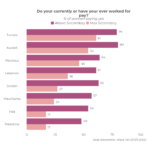“Due to the ongoing conflict, most Syrian refugees have fled to countries that neighbor Syria and the governments of these developing countries are now the principal entities for implementing Syrian refugee policies. These policies accommodate refugees in camps or provide refugees with residency in urban areas, but impose severe restrictions on their employment. Betts and Collier, professors at the University of Oxford, UK, are advocating a new approach that allows refugees to work in special economic zones. The approach is revolutionary in terms of refugee policies because it contributes to the idea of the host country as an economic entity rather than simply a recipient of humanitarian assistance. However, to implement this policy approach for Syrian refugees in Jordan, it would be essential to determine their potential as a workforce. According to the public opinion survey we conducted, the level of education and foreign language proficiency of Syrian refugees residing in Jordan is low compared to Palestinians with Jordanian citizenship or Syrians who remained in their country. Subsequently, the processes of educating and training people whose capacity is lower than the citizens of the host country and converting them into a workforce are inconvenient facts…”
Visit External SiteTopics
- Charity2
- Corruption113
- COVID-1969
- Democracy35
- Discrimination13
- Economy225
- Education51
- Environment36
- Extremism19
- Freedoms50
- Gender Issues159
- Governance253
- Health44
- International Relations192
- Labor Market34
- Media31
- Migration63
- Political Institutions213
- Political Participation33
- Political Systems60
- Refugees6
- Religion118
- Security31
- Social Justice44
- Wellbeing2
- Youth75


